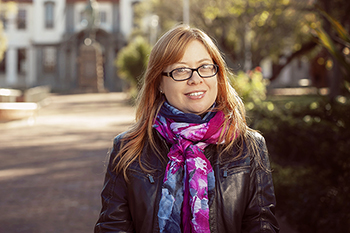Latest News Archive
Please select Category, Year, and then Month to display items
14 June 2024
|
Story Anthony Mthembu
|
Photo Suplied
 Jeremiah Hlahla, a UFS student completing his PhD in Botany at the University of Debrecen as part of an exchange initiative funded by the Erasmus+ Mobility Programme.
Jeremiah Hlahla, a UFS student completing his PhD in Botany at the University of Debrecen as part of an exchange initiative funded by the Erasmus+ Mobility Programme.
As part of an exchange initiative facilitated by the Erasmus+ Mobility Programme, Jeremiah Hlahla, a student at the University of the Free State (UFS), is nearing the completion of his PhD studies at the University of Debrecen in Hungary. Hlahla’s journey, which began in February 2024 and is set to conclude in July 2024, has been a remarkable learning opportunity. “As a first time-traveller to Europe, I have thoroughly enjoyed engaging with people from different countries and cultures,” he said.
The benefits of international collaboration
Hlahla is currently pursuing a PhD in Botany, focusing on plant stress physiology. “My current PhD project investigates the physiological, biochemical and morphological responses of vegetable-type soybean, or edamame, to combined drought and heat stress,’’ he explained. He considers the University of Debrecen the ideal institution to complete his research due to its extensive expertise and resources in similar projects. He noted that his colleagues at Debrecen conduct significant work on plant protection against biotic and abiotic stresses, including salt and drought stress, as well as proteins and amino acids in barley and other legumes.
Given the vast knowledge available on similar projects, Hlahla has found substantial engagement with his work at the University of Debrecen. “Upon arrival, I delivered an introductory lecture presenting my UFS project on the synergistic effects of combined drought and heat stress on the physiology and biochemistry of edamame. It was an engaging session as everyone could relate to my work and asked many questions,’’ he said.
Insights gained from the exchange
Hlahla has also gained valuable lessons that will assist him in his research career, including biotechnology and physiology tools. “I learned how to prepare samples and use high-performance liquid chromatography (HPLC) and reversed-phase ultra-high-performance liquid chromatography (UHPLC) to quantify proteins and amino acids,’’ he said. These techniques are beneficial not only for his current work but will also support future soybean research.
As his experience at the University of Debrecen nears its end, Hlahla reflects on the collaborations and friendships he has formed, which stand out as a significant highlight.
Leading African Studies scholar to represent UFS as research fellow at Leiden University
2016-03-10

Dr Stephanie Cawood to devote three months at the African Studies Centre Leiden as a visiting research fellow to further her research on the rhetorical imprint of Nelson Mandela.
Photo: Supplied |
Dr Stephanie Cawood, Programme Director and Senior Lecturer at the University of the Free State (UFS) Centre for Africa Studies has been offered a visiting research fellowship to the African Studies Centre Leiden (ASCL) at Leiden University in the Netherlands. The ASCL is entirely devoted to the study of Africa transcending multiple faculties and is known for its extensive library.
As a visiting research fellow from April to June 2016, Dr Cawood looks forward to expanding her network as well as intellectual horizons with the broad spectrum of knowledge archived by the ASCL. “Working so closely with the scholars at the African Studies Centre Leiden will enrich my research and broaden my international footprint as a scholar,” Dr Cawood says.
Her research at ASCL follows on her doctoral research on the former president of South Africa, Nelson Mandela’s rhetorical imprint, and will explore the conceptual, cultural, ideological and historical influences that shaped the thought and rhetoric of Nelson Mandela. She is particularly interested in studying the intertextual dynamics in Mandela’s rhetoric with historical figures such as Jawarharlal Nehru, Martin Luther King Jr and Winston Churchill.
According to Dr Cawood, this research “will deepen the understanding of Nelson Mandela’s rhetorical journey from struggle to liberation and unpack the various influences that made him the political figure he ultimately became.”
During her tenure at Leiden University, Dr Cawood will prepare a manuscript to be published by the ASCL as a working paper and also present seminars.